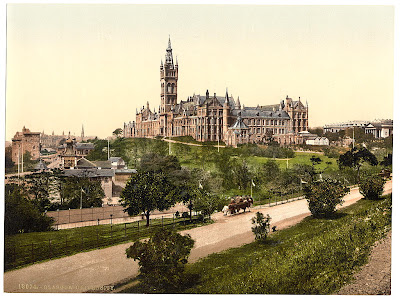I am quite excited. Today will be the very first Gifford Lecture and I will be there to witness it! The famous and illustrious Gifford Lectures, which every scholar and scientist dreams of being invited to, one of the greatest honors any person can hope to attain.
 |
| Adam Lord Gifford |
Lord Gifford had another life though. By day he was a judge, and by night a student of philosophy and metaphysics. After he retired he gave popular lectures on such subjects as Ralph Waldo Emerson, St. Bernard and Hindu reincarnation. He was an advocate for Natural Religion--religion based on common sense rather than on miracles. It is a marriage of science and religion. The Scots don’t see them as opposites any more than they see industry and art as opposites.
 |
| University of Glasgow as it looks now in 1888 |
The first lecture will be given by Friedrich Max Müller, the famous philologist and Orientalist. His interests turned from poetry and music to philosophy early on. He did his doctoral dissertation on Spinoza’s Ethics. (Spinoza was a favorite of Lord Gifford’s, too.)
Müller always had a gift for languages, perhaps because his father was a poet. He learned Greek, Latin, Arabic, Persian and Sanskrit. He left Leipzig University to go to Berlin to study with philosopher Friedrich Schelling and to translate the Upanishads for him.
From there he went to Paris to further his studies and then on the England to get access to the Sanskrit collection of the East India Company. (Learning French and English posed no problem for Müller.) He eventually became Oxford's first Professor of Comparative Theology and is considered one of the father’s of comparative religion. Müller is currently working as editor and one of the translators for Oxford University Press’ massive 50 volume Sacred Books of the East, a monument to Victorian scholarship.
Anthropology is in its infancy in the 19th century. Too many are using it to prove that their people are more civilized than everyone else who thinks differently. Personally I just find it fascinating that our species came up with so many ways to survive and to view the world. While Müller is a devout Lutheran, he respects the religions of others. For instance, he is a great admirer of Ramakrishna Paramhansa (1836-1886) and has authored several books and essays on the Indian Hindu mystic.
 |
| Friedrich Max Müller |
And of course modern scholars could tear apart some of Müller’s theories--including ones he himself has long since abandoned by 1888. Others might find him a little too smug of his own culture. One must remember Müller was brought up in another time and didn’t have all the knowledge we now have. A thousand years from now, people will probably laugh at us, too, for being ignorant and too homo sapien-centric. Remember it was only in the 26th century that the study of sentient aliens was considered anthropology and not zoology.
Perhaps the greatest tribute to Müller is how the Indians regard him. He is seen as an enlightened sage and his Oxford home is a place of pilgrimage for gurus traveling westward who want to meet the mahatman or “great soul.” While other Englishman belittle Indian traditions, Müller introduces them to the British and the rest of the English speaking world so they can really see India for the first time. The job of an anthropologist is not to pass judgment on another culture but to show it to the folks back home with all its beauty and ugliness. In other words, to show we are all human after all.
A list of Gifford Lectures speakers from 1888 to 2010
Sacred Books of the East for your perusal.




No comments:
Post a Comment
Due to bots sticking ads into the comments I am now forced to moderate. Differing opinions are welcomed. This is history, which is the surviving written record, which may or may not be accurate. I will even allow comments pushing other books or websites as long as they are relevant.